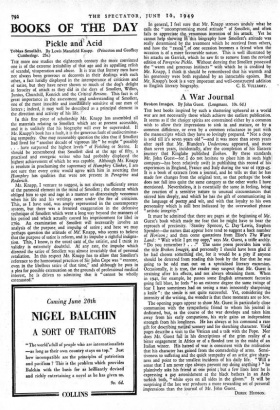A War Journal
Broken Images. By John Guest. (Longmans. 10s. 6d.)
THE best books inspired by such a shattering upheaval as a world war are not necessarily those which achieve the earliest publication. It seems as if the choicer spirits are constrained either by a common wish to allow their impressions to sink in and mature, or by a common diffidence, or even by a common reluctance to part with the manuscripts which they have so lovingly prepared. "Not a drop is sold till it's seven years old "—and it was more than seven years after 1918 that Mr. Blunden's Undertones appeared, and more than seven years, incidentally, after the completion of his Eastern journey that Kinglake published Eothen. By these standards Mr. John Guest—for I do not hesitate to place him in such high company—has been relatively swift in publishing this record of his experiences in England, France and Italy during the war of 1939-45. It is a book of extracts from a journal, and he tells us that he has made few changes from the original text, so that perhaps the book does not fall into quite the same category as the other works I have mentioned. Nevertheless, it is essentially the same in feeling, being the reaction of a sensitive nature to unusual circumstances that stirred him deeply, and which he has the gift of communicating in the language of poet cy ,and wit, and with that loyalty to his own personality which is still best indicated by the overworked phrase "artistic integrity."
It must be admitted that there are pages at the beginning of Mr. Guest's book which made me fear that he might have to bear the reproach of preciosity. ' Stanley Spencer C. Day 'Lewis, Stephen Spender—the names that appear here tend to suggest a back number of Horizon ; and then come quotations from Eliot's The Waste Land: "Wait while I get my copy," says Mr. Guest, a trifle archly. "Do you remember ? . . ." The same poem provides him with the title Broken Imags and personally I should have been glad if he had chosen something else, for it would be a pity if anyone should be deterred from reading this book by the fear that he was going to be odd man out on a specialised literary excursion. Occasionally, it is true, the reader may suspect that Mr. Guest is straining after his effects, and not always obtaining them. When in 1941, for example, he passes some English armament factories going full blast, he feels "to an extreme degree the same twinge of fear I have sometimes had on seeing a man innocently sharpening a knife ": the simile is not quite successful. Yet, considering the intensity of the writing, the wonder is that these moments are so few.
The opening pages appear to show Mr. Guest in particularly close communion with the sympathetic friend to whom his journal is dedicated, but, as the course of the war develops and takes him away from his early companions, his style gains an independent strength from his loneliness. He has always at his command a rare gift for describing natilral scenery and for sketching character. Vivid pages describe a visit to the Vatican and a talk with the Pope. Nor does Mr. Guest fail in his descriptions of the grim reality of a bitter engagement in Africa or of a flooded tent in the midst of an Italian winter. His hatred of war is consistent with the realisation that his character has gained from the comradeship of arms. Sensi- tiveness to suffering and the quick sympathy of an artist give sharp- ness and point to the smallest incidents of his daily life. "Will a sense that I am never ripe always prevent my doing anything ? "he plaintively asks his friend at one point ; but a few lines later he is expressing a gay astonishment at the black bathers in an Arab turlcish bath, "white eyes on all sides in the gloom." It will be surprising if the last war produces a more rewarding set of personal impressions than the journal of Mr. John Guest.
DEREK HUDSON.


































 Previous page
Previous page